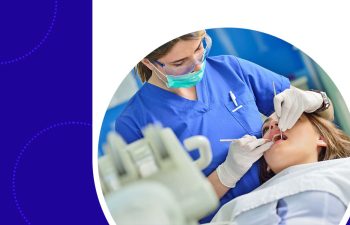Can Dentists & Dental Hygienists Do Botox?

Frequently Asked Questions
The surge in Botox’s popularity is music to medical providers’ ears for a few reasons. These procedures are minimally invasive, easy to perform, low risk and profitable for medical practices. Another perk of Botox injections? Healthcare providers other than physicians are authorized to administer them in many states!
At The American Association of Aesthetic Medicine and Surgery (AAAMS), we regularly receive questions from dental professionals about whether they’re qualified to take our Botox and dermal filler training courses and get certified to perform them. Read on to see which positions are eligible to administer injections!
Why Botox and Dermal Filler Injections Make Sense for Dental Applications
There are three main reasons Botox and filler training are a perfect fit and smart career move for dental practices.
- The market for aesthetic medicine is exploding
- Dentists are already ahead of the game
- Botox has multiple dental applications
Let’s take a closer look at each of these reasons.
The Market for Aesthetic Medicine Is Exploding
The demand for cosmetic procedures is roaring, but don’t take our word for it. Business and finance magazines are dedicating multi-page spreads to the aptly named “zoom boom,” the phenomenon responsible for driving the post-pandemic surge in non-invasive aesthetics procedures.
Simply put, aesthetic medicine is one of the hottest markets that any dental or medical professional can enter, especially because Botox and dermal filler certification are fast, fun, affordable and easy to integrate into your existing practice.
Dentists Are Ahead of the Game
Dentists have a distinct advantage when it comes to performing Botox injections.
Firstly, dentists are already focused on the face with prior training in facial anatomy, making them a perfect fit for aesthetic medicine. Second, the role of a dentist requires meticulous attention to detail. Third, dentists have a very “up close and personal” relationship with their patients and are typically highly skilled at managing patient interactions and helping them feel comfortable and at ease.
Each of these strengths is necessary for a successful career in aesthetic medicine, and compared to most other aspiring injectors, dentists are ahead of the game. And as more and more patients seek cosmetic applications of aesthetic injectables from dental providers, many dental practices aspire to become one-stop shops for dental work and aesthetic treatments. This makes a lot of sense considering dentistry has a strong aesthetic component.
With its focus on the health and appearance of the lower face means that dental patients are already primed for aesthetic treatments for the following concerns:
-
- Peau d’Orange: Patients often present to dental practices with complaints of peau d’orange, or “orange skin,” the medical name for the dimples, divots, and ripples that can appear on the chin. These characteristics are caused by a chronic contraction of the mentalis muscle, but Botox injections can easily and effectively treat them.
-
- Mental creases, marionette lines, and jowl formation: Both Botox and dermal fillers can each soften or erase the horizontal crease and volume loss that can form and deepen beneath the mouth with age. These products can also replace chin volume, improve marionette lines and restore youthful jaw contours.
-
- Lip enhancement: With its focus on the mouth, lip enhancement is among the most complementary procedures dental hygienists can offer. Dentists can do lip fillers and Botox separately or in conjunction to create many different lip styles.
Botox Has Multiple Dental Applications
Botox is useful for more than just aesthetic enhancement. Dental practices represent an ideal environment for both aesthetic and non-aesthetic applications. Botox injections can effectively treat many of the problems and cosmetic concerns that dental patients commonly present with, including:

-
- Teeth grinding, jaw clenching, and TMJD: While oral teeth guards can mitigate dental damage from grinding and clenching, they can’t prevent other problems that often arise from this activity like headaches and jaw, neck and shoulder pain. Injecting Botox into the masseter weakens the muscles responsible for teeth-grinding and jaw-clenching, reducing the tension that produces pain in other areas.
-
- Migraine Headaches: Botox is FDA-approved for treating chronic migraine headaches. Injecting Botox into nerve endings can reduce the frequency and severity of migraines by hindering the mechanisms responsible for sending pain signals. Learn more about our course dedicated specifically to relieving migraines with Botox.
Botox for Hygienists: Does Your State Allow It?
Dental hygienists are only authorized to administer Botox injections on a state-by-state basis. Nearly two dozen states permit dentists to administer Botox or supervise the procedure for cosmetic reasons, with varying rules on whether and when dental hygienists can participate.
If you are a dental hygienist, you are eligible to take any of our courses. If you are looking to get certified and perform injections on your own, you must be in an eligible state.
Contact your state’s dental board to learn about Botox regulations for hygienists in your state.
Take Your Dental Career to the Next Level with AAAMS
AAAMS is a fully-accredited, industry-leading platform for excellence in aesthetics education. We’ve been training thousands of dentists, doctors, and other health care providers in the art of aesthetics and cosmetic procedures since 2006.
We equip you with the tools you need to expand your dental practice with aesthetic medicine. With world-class instructors, a rigorous yet highly engaging curriculum, a fast track to certification and an exclusive professional network that sets you up for success from day one, you will love training with us!
If you are a dentist or dental hygienist in a consenting state, you can start working on your certification today! Sign up for the Aesthetics 101 virtual class or the Aesthetics 101 hybrid class to begin your dental Botox training. If you’re not in a consenting state, you can still earn continuing education credits or learn through our other courses.

Posted on behalf of
640 South San Vicente, Suite 210
Los Angeles, CA 90048
Phone: (310) 274-9955
info@aaams.net
Monday - Friday 9:00 AM – 5:00 PM
